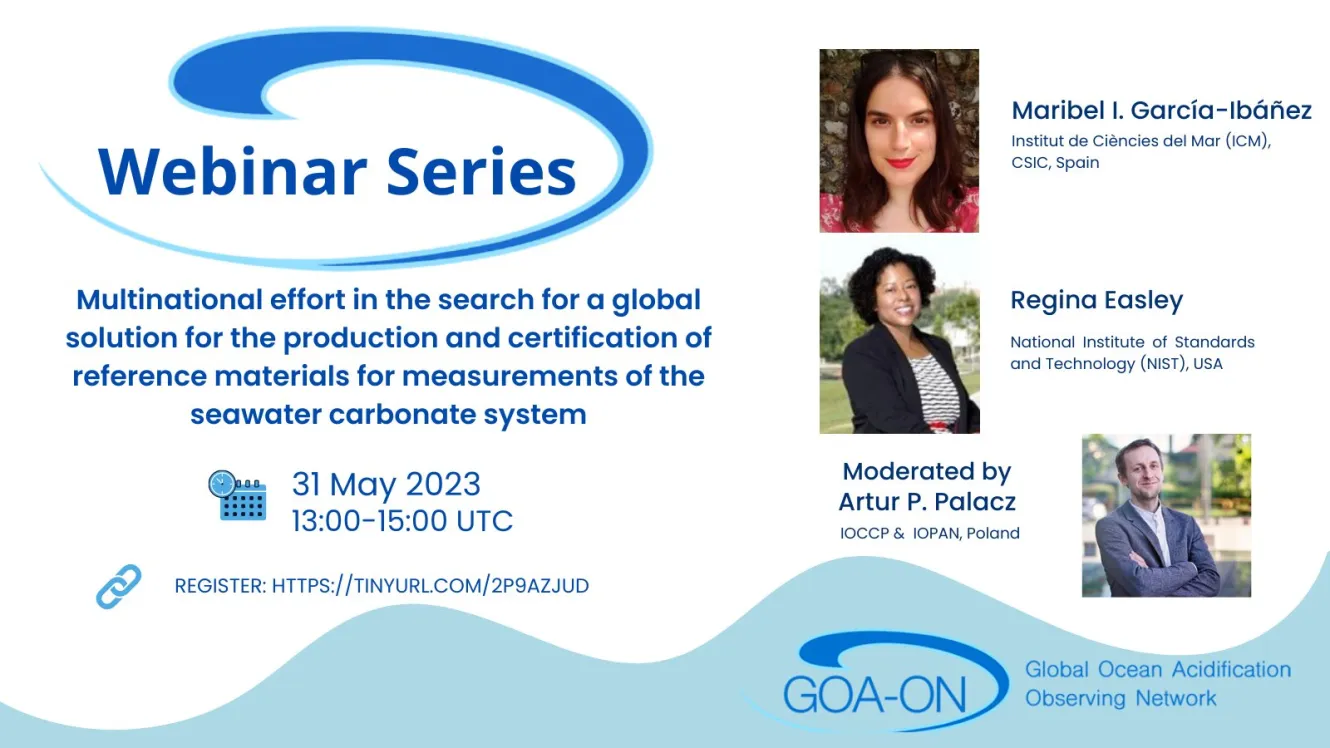We are excited to invite you to attend the next Global Ocean Acidification Observing Network (GOA-ON) webinar organized jointly with IOCCP on "Multinational efforts in the search for a global solution for the production and certification of reference materials for measurements of the seawater carbonate system." The webinar will feature two presentations from Maribel I. García-Ibáñez (CSIC, Spain & IOCCP SSG member) and Regina Easley (NIST, USA), followed by a live discussion. The event will be moderated by Artur Palacz, IOCCP Project Officer.
The webinar will be held on 31 May 2023, at 13:00 - 15:00 UTC. Please register in advance via the webinar website: https://unesco-org.zoom.us/webinar/register/WN_T5zropWYRh-Bzxktxgftrw#/registration Please see below for the webinar abstract and more information about the speakers.
Abstract:
High-quality measurements of the seawater carbonate system allow us to quantify and understand the oceanic uptake of atmospheric carbon dioxide (CO2) and monitor ocean acidification. Those seawater carbonate system measurements rely on the availability of reference materials (RMs). The COVID-19 pandemic highlighted the fragility of the production system of the seawater RMs for the carbonate system, currently depending on one single laboratory. With that in mind, a new model for seawater RMs for the carbonate system, centered on regional hubs, is being discussed to create a more resilient system. The proposed new model for seawater RMs for the carbonate system requires unprecedented involvement of National Metrology Institutes (NMIs) on a global level. The integration of the new model into the global metrology landscape will help to produce the RMs that are comparable and metrologically traceable to the International System of Units.
Speakers:
Maribel I. García-Ibáñez
Postdoc, Institut de Ciències del Mar (ICM), CSIC, Spain
Maribel is a biogeochemical oceanographer interested in the link between chemical and physical oceanographic processes and their implications in the marine environment. Her main research areas are the chemistry of the ocean inorganic carbon cycle (in particular ocean acidification) and the water mass formation, transformation, and circulation in the North Atlantic Ocean, the Southern Ocean, and the Mediterranean Sea. Her work experience also includes leakage detection in offshore reservoirs related to carbon capture and storage (CCS) and analysis of tipping points for North Atlantic cold-water corals. She is a member of the Scientific Steering Committee of the International Ocean Carbon Coordination Project (IOCCP), under the theme Ocean Interior Observations from Ships and Autonomous Vehicles, where she helps to coordinate the discussion on the design of a new, more resilient production model of reference materials for the seawater carbonate system.
Regina A. Easley
Research Chemist, National Institute of Standards and Technology (NIST)
Regina graduated from Hampton University (B.S. in Chemistry) and University of California, Los Angeles (M.S. in Organic Chemistry) prior to completing her doctoral degree in Chemical Oceanography at the University of South Florida. In her role as a NIST Research Chemist, she comanages the electroanalytical chemistry laboratory which is responsible for the production of pH Standard Reference Materials. Additional research in her laboratory focuses on establishing a new NIST program to certify ocean carbon parameters (pH, total alkalinity, and total dissolved inorganic carbon). She also serves as an affiliated faculty member at Georgetown University’s Environmental Metrology and Policy (EMAP) program.
Moderator:
Artur P. Palacz
IOCCP Project Officer, Institute of Oceanology Polish Academy of Sciences, Poland
Artur holds a B.Sc. in Geosciences & Astrophysics from Jacobs University (Germany) and a Ph.D. in Oceanography from the University of Maine in Orono (USA). As an oceanographer, he took advantage of this transdisciplinary education to explore innovative approaches to combining multi-platform ocean observations with ecosystem model results while contributing to numerous international projects, and providing scientific advice. Since 2016, Artur has been working as a researcher at the Institute of Oceanology Polish Academy of Sciences (IOPAN, Poland) and Project Officer of the International Ocean Carbon Coordination Project (IOCCP), providing coordination and communication support for the marine biogeochemistry observing community, and more broadly for the Global Ocean Observing System (GOOS).

